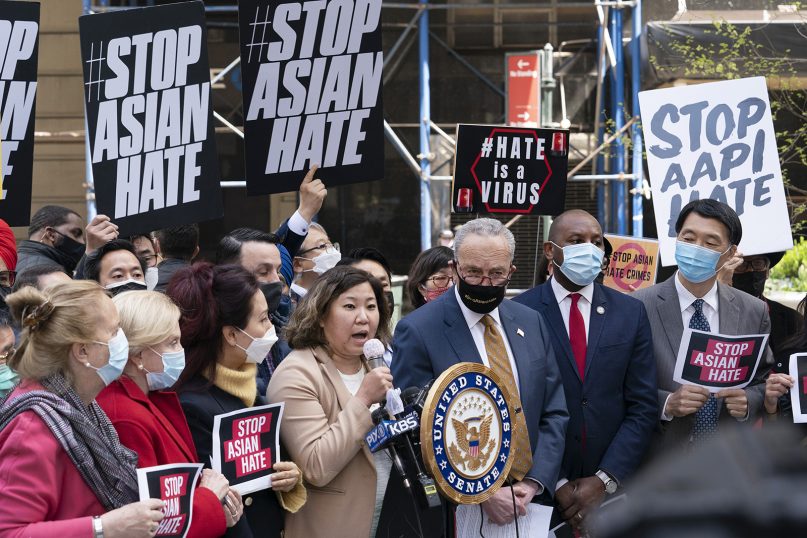(RNS) — Sometimes a vampire is not just a vampire. Take Dracula. To Lucas Kwong, an assistant professor of English at New York City College of Technology, the popular turn-of-the-century novel and its titular bloodsucker are a parable of white European fear and anti-Asian racism.
“’Dracula’ is, in some ways, about reverse colonization — the fear that foreigners will come over to the West and launch an anti-Christian attack,” Kwong said in a phone interview with Religion News Service.
Kwong said his research on postcolonial theory and Victorian literature has given him insight into the historical roots of anti-Asian hatred, displays of which have been on the rise over the past year. Kwong, who identifies as Christian, believes members of his faith have contributed to that rise.
In January, Kwong published “An Open Letter On Anti-Asian Racism & Christian Nationalism,” calling on self-identified Christian politicians to personally repent of racism. To date, more than 700 people have signed it, among them prominent Asian American Christians Michelle Ami Reyes, Daniel Chou and Jeffrey Kuan.
“What is singular about this open letter is that it goes beyond general critiques of racism,” Kwong said. The letter protests specific politicians who it says have stoked anti-Asian or anti-Chinese sentiment.
Kwong said a particular tweet by Tennessee Sen. Marsha Blackburn inspired him to craft the letter. “China has a 5,000 year history of cheating and stealing. Some things will never change,” Blackburn’s tweet said.
In May, Stop AAPI Hate reported nearly 7,000 hate crimes perpetrated against Asian Americans and Pacific Islanders since March 2020. While Christian organizations have condemned racism and called for solidarity with Asian Americans, Kwong believed there wasn’t enough attention given to Christianity’s responsibility in stoking anti-Asian racism.
“By the end of 2020, it was abundantly clear that there was a link between anti-Asian rhetoric and Christian nationalism,” Kwong said. “There is a long history there.” He wanted a statement that condemned that tie. “There hasn’t been much discussion of the link between the two,” he said.
RELATED: Black and Asian Christian leaders discuss role of church in fighting racism

Lucas Kwong. Courtesy photo
Last year, the Asian American Christian Collaborative issued a statement on anti-Asian racism calling on signatories to “hold elected officials accountable for their words and inaction.”
“What that statement proposed — that the church needs to confront anti-Asian racism — my open letter is putting into practice,” Kwong said.
Kwong’s letter specifically addressed comments made by Blackburn, Sen. Ted Cruz of Texas, U.S. Rep. Paul Gosar of Arizona and 11 others.
“It’s not a coincidence that the politicians who have made inflammatory statements about China and Chinese people are self-identified Christians. It is attributable to a particular theology of nation and, ultimately, of race,” he said.
Kwong’s letter contains a list of demands that begins with calling for personal repentance by the politicians. “Repentance and transformation go hand in hand,” Kwong said. If the politician fails to publicly repent, then the letter demands that his or her denomination’s leaders step in.
“We call for the leaders of these politicians’ churches (to) meet with the offending members, urging them to repent of the sin of racism and consequent endangerment of Asian lives,” the letter reads. It calls for disciplinary actions “up to and including stripping the offending members of membership.”
Kwong has received some pushback to that particular demand and to the letter in general. He says he’s sent thousands of emails — a lot of the responses have been skeptical. “I think people want to be supportive, but not publicly. Once you start getting more particular, I think people get more uncomfortable,” he said.
RELATED: Same, but different: Notes on Black Christian solidarity against anti-Asian racism
Once his letter reached the “biblical number” of 700 signatories, Kwong said, he reached out to many of the churches holding denominational meetings this summer. He hopes the letter will raise awareness among denominational leaders and perhaps prompt discussion about drafting a resolution during their meeting.
And Kwong hopes the number of signatories will encourage denominational leadership to take his letter and its concerns seriously. “This is not just a handful of people with quirky views,” he said.





